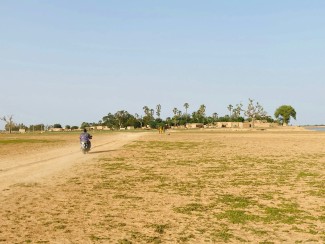A year into Covid-19 being declared a global pandemic, this month’s Aid for Trade stocktaking event, organized by the Development Division of the World Trade Organization (WTO), offers a timely opportunity to assess impact on developing and least developed countries’ (LDC) trade needs, discuss how to make the recovery sustainable and mobilize financing where it is needed most.
From March 23rd to 25th, nearly 40 sessions – ten of them hosted by the LDC Group or individual LDCs and their partners – will focus on issues ranging from digital transformation and tourism revival to pharmaceutical value chains and economic resilience. The event will aim to identify the impacts of Covid-19 on LDCs and developing countries, including what needs and constraints it has highlighted, as well as how developments partners’ priorities need to shift in the years ahead.
LDC support more urgent than ever
LDCs have been hit hard by the pandemic. Global lockdowns from Q2 last year triggered a plunge in demand for the hydrocarbons, metals and other commodities that dominate the exports of many, with countries like Angola suffering severe hits to their financing and budgets. And while those LDCs that have made inroads into global value chains for food were buffered by more stable demand for agricultural commodities, many of the same continue to be impacted by a slump in tourism receipts. Although the latest WTO Trade Barometer suggests a recovery in global trade is underway, it is patchy, with passenger air transport and ICT, for example, remaining very depressed.
“There is still a sense of urgency about how we get out of this,” said Michael Roberts, Head of Aid for Trade at the WTO. “Now, we can really start to take stock of what the impact has been, how we are coping and how much further we need to go.”
With the pandemic revealing that levels of income are not a good proxy for best practice, either in managing the virus or implementing the best economic policies to limit its impact, “there’s also a tremendous amount that members at different levels of development can learn from each other,” he added.
While the entire world is suffering due to the pandemic, LDCs are most severely affected, agreed Buddhi Prasad Upadhyaya, Counsellor/Deputy Permanent Representative (Commerce), Permanent Mission of Nepal to the UN, WTO and other international organizations. Supply chain disruptions in destination markets were disastrous for LDC exports, and local lockdowns exacerbated logistical challenges in-country, he explained. And although infection rates appear lower in some LDCs than in many developed and developing countries, this could be distorted by lack of mass testing, he added.
“LDCs are not capable of recovering without additional support,” he stressed. “This event will provide us with a comprehensive picture, including different information and disaggregated data that will help us design a future course of action, not only from a global level but also regional and national.”
Influence investment plans and identify mutual benefits
The event also offers a chance for LDCs to make the case for continued support from donors at a time when shrinking gross national income in many developed countries creates uncertainty about overall aid allocations and the percentage that may be directed towards LDCs, Roberts noted.
It comes at an opportune time for top Aid for Trade donor the EU, which recently approved its budget for the next seven years and is now planning how and where to invest it, according to Cecile Billaux, Head of the Unit for Micro-economic Analysis, Investment Climate, Private Sector, Trade and Employment in the European Commission’s Directorate-General for International Partnerships.
Pandemic recovery has been prioritized, with the Directorate-General frontloading the bulk of its 2020 payments under Budget Support programmes, in which virtually all LDCs are covered, she said. The proportion of EU Aid for Trade funding directed at LDCs is already growing – currently at 22%, with a target to hit 25% by 2030 – and the EU is working to keep its focus on support for more challenged members of the group, rather than focusing on “quick wins” investments in those countries with more mature investment climates and infrastructure. “As trade actors, there’s always a tendency to go to the most developed of the less developed countries,” she noted.
The event will help donors and international organizations identify opportunities for mutual benefit, noted Upadhyaya. The higher marginal productivity of capital in LDCs allows companies in developed countries to reduce production costs and increase profit margins from investing in and trading with LDCs, while their consumers benefit from high-quality, affordable products and services, he explained.
Contribute to environmental sustainability
Enabling LDCs to take a fairer share of global trade is also good for the planet, with many LDC agricultural products being by default organic and sustainably produced, Upadhyaya added.
This positions them well to benefit from the EU’s Green Agenda, which will see the bloc prioritize more inclusive, socially responsible and environmentally friendly value chains and consumption patterns in its Aid for Trade support, said Billaux. As LDCs diversify, they have an opportunity to green their energy sources, for example, by shifting into solar, wind, geo-thermal or hydrogen to power the production of key exports, she added.
Together with representatives from Canada and the ITC, the EU will provide more detail on this approach in its Promoting an inclusive, green recovery panel on day one of the stocktaking event.
Opportunities in e-commerce, branding and intellectual property
There are several other key LDC concerns that will be explored in more depth at the event, some directly related to the pandemic and others more structural and long term in nature.
For example, e-commerce and digital trade have emerged through the pandemic as one area of growth that LDCs have struggled to tap, due to limited ICT infrastructure and insufficient human and institutional capacity, while inadequate access to technology more broadly hinders LDCs’ diversification efforts, Upadhyaya noted. Support is also needed in human resource and institutional capacity, as well as in branding, labelling and product design so that LDCs can add value to their production. Cross-border facilitation is of particular importance to land-locked countries, tourism revival is crucial to many developing and less developed WTO members, and all LDCs need to find a way to benefit from the global intellectual property system with support from donor country members, rather than bear it as a burden, he argued.
To register for the event, visit https://www.wto.org/english/tratop_e/devel_e/a4t_e/gr21_e/gr21_e.htm
If you would like to reuse any material published here, please let us know by sending an email to EIF Communications: eifcommunications@wto.org.



